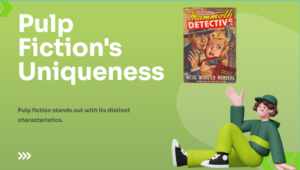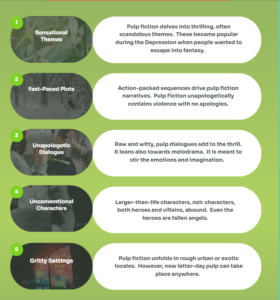WHAT IS PULP FICTION?
 Pulp Fiction become popular during the depression of the 1920s and 1930s. Publishers at the time used a very cheap “pulp” paper in order to produce these short stories and magazines that cost about a quarter. Yes, twenty-five cents!
Pulp Fiction become popular during the depression of the 1920s and 1930s. Publishers at the time used a very cheap “pulp” paper in order to produce these short stories and magazines that cost about a quarter. Yes, twenty-five cents!
During the depression, life was difficult and people didn’t want to struggle to make sense of what authors meant by long run on sentences. They didn’t have the stomach or patience for prose. During a depression, people are lucky they can concentrate at all. They wanted escape and the publishers gave it to them in the form of pulp fiction.
Pulp magazines were filled with adventurous stories with hard-boiled detectives, larger-than-life heroes, space travelers. There was no subtlety. It was all straight-talking dialogue. The plots were fantastical and melodramatic, but easy to follow and easy to read.

A QUICK HISTORY OF PULP FICTION:
In the late 1800s and early 1900s, classical literature was popular. I would even refer to it as high-brow fiction. Oscar Wilde, H G Wells, Jack London, Upton Sinclair, F. Scott Fitzgerald, Ernest Hemingway, William Faulkner. These authors are known not only for their storytelling ability, but their prose, their wordsmithing. This is what I consider ‘high-brow’. Their books are not read-’em and toss-’em books. They are written to read and contemplate, maybe even read again and again.
Agatha Christie was also a part of this list of popular authors at the time, but she may have influenced the pulp fiction genre more than any of the other authors. Her multi-suspect mysteries were extremely popular
Pulp fiction’s prose was everyday tough talk. There were clever phrases to read and re-read. There was no deep concepts to contemplate. It was mostly action, reaction and romance. The plots were sensational, violent and maybe strange, but they were easy to read; perfect for people who are distracted and worried.
WHAT MAKES PULP FICTION DIFFERENT?

WHAT CAN NEW AUTHORS LEARN FROM READING PULP FICTION?
- Reading pulp fiction can help new authors know the difference between believable action and over-the-top action.
- It can help an author know the difference between writing emotions and over-the-top melodrama.
- It can help an author know how to quickly introduce a character.
- It can show a new writer how to quickly get to the point of a story and keep it lean and tight.
- It can help an author learn how to handle the passage of time, and much more.
Because most of the pulp fiction is short, it can help an author to easily see how the pulp fiction writer handled foreshadowing, passage of time, action scene descriptions, fight scenes, how much and how little back story is needed in a short story. There is much more for a new author to learn from reading pulp fiction.
